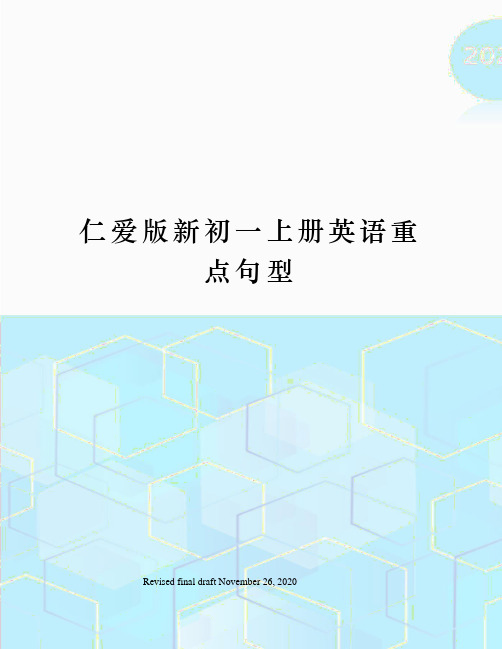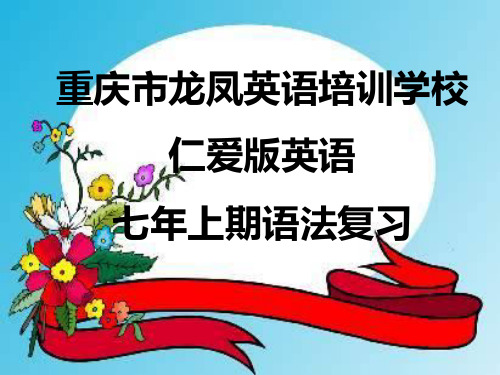((仁爱版))[[初一英语课件]]仁爱版七年级英语上《句型转换》PPT课件 (3)
仁爱版初中英语课件七年级上U1 T2 S A

where 在(到)哪里 from 来自,从
/'kænədə/ n. Canada 加拿大
/ə'merikə/ n. America 美国
/dʒə'pæn/ n. Japan 日本
/'iŋglənd/ n. /ðeɪ/ pron. /hu:/ pron. /'kju:bə/ n. /hi:/ pron. /ʃi:/ pron.
Where is she from?
She is from _t_h_e_U_S_A___ / _A__m_e_r_i_c_a__.
/'kæ nədə/ Canada Where is he from? He is from Canada.
Havana 哈瓦那
/'kju:bɚ/ Cuba
Where is Maria from? She is from Cuba.
1. be 动词的用法
我(I)是 am, 你(you)是are; is 跟着 他(he)她(she)它(it) 单数用is, 复数要用
Grammar
Be动词
单数
复数
主格 be动词 主格 be动词
第一人称 I am 第二人称 you are
he 第三人称 she is
it
we are you are
一、根据音标或意思写出下列单词
1./ik'skju:z/ 2./mi:/ 3./wɔt/ 4./jɔ:(r)/ 5./neɪm/ 6./'pli:z/ 7./weə/ 8./frɔm/
9. 加拿大 10.美国 11.日本 12.英格兰13./ðeɪ/
14./hu:/ 15.古巴
七年级上册仁爱版英语课件

Restaurant types: There are many different types of restaurants, including fast food, casual dining, fine dining, and ethnic restaurants that specialize in cuisine from a specific country or region.
Clubs and organizations
01
Lists the various clubs and organizations available at the school, including their meeting times and activities.
Extracurricular activities
Curriculum overview
Details the requirements for each subject, including the credits needed to graduate and any prerequisites for advanced courses.
Subject requirements
详细描述
Unit 4: Daily Life
04
总结词
列举周末常见的休闲活动。要点一要点二Fra bibliotek详细描述
On weekends, students often have time to rest and relax. They might watch TV, read books, play video games, or go out with friends. Other popular weekend activities include sports, hobbies like painting or music, or helping around the house.
仁爱七年级上册全册重点语法短语句型图文稿

仁爱七年级上册全册重点语法短语句型集团文件版本号:(M928-T898-M248-WU2669-I2896-DQ586-M1988)u n i t1G r e e t i n g t o k n o w y o u 记忆26个英文字母大小写对照Aa Bb Cd Dd Ee Ff GgHh Ii Jj Kk Ll Mm NnOo Pp Qq Rr Ss TtUu Vv Ww Xx Yy Zz本单元应记英语单词1、重点动词know v 认识; excuse v 原谅;meet v 见面,会面,遇见 welcome v 欢迎;thank v 谢谢; see v 看见,看到,明白let v 让; begin v 开始,着手;stand v 站,立 sit v 坐;have v 有,吃,喝,进行,经受; am/is/are/were/was 是do v/aux 做,干,行动(构成否定句、疑问句的助动词、无意义)2、重点介词to prep 到,往 from prep 从;从……起3、重点代词me ,you ,my,I,she,he,he,his,they,thoseit,this,that,these,those4、连词and,or,5、疑问代词what,which,where,when,who(某个时间,某个地点,谁和哪一个发生了什么事情)6、助动词do.does,did,don't,didn't,doesn't二、重点句型1、用于回答时两种形式(现在时态)Yes,I am; No,I 'm notYes,he is; No,he isn'tYes,she is; No,she isn'tYes,they are; No,they aren't过去时态回答Yes,I were No,I weren'tYes,She was; No,She wasn'tYes,he was; No,she wasn'tYes,they were; No,they weren't2、用于指示this is a bookthat is a pencilthese are dogsit is a Telvision3、打招呼早晨:Good morning;回答:Good morning;hi;hello一般国外人比hi,hello中午:Good afternoon晚上:Good night4、来自于……地方be……from(1)、特殊疑问句时,某人来自于什么地方where +be动词+人称代词+from?回答:人称代词+be动词+from+地点。
七年级英语句型转换课件

通过句型转换,我们可以扩展
通过转换句型,我们能更深入
句型转换能够帮助我们培养灵
自己的表达范围,使语言更加
地理解句子的结构和语法规则,
活运用语言的思维方式,使我
丰富和灵活。
提高我们的语言理解能力。
们在学习和表达中更具创造力。
常见的句型转换方式
1
疑问句和陈述句转换
将陈述句转换为疑问句,或将疑问句转换为陈述句,可以更有趣地表达观点和提出问题。
1
动词转换
Swimming is a good exercise.
2
常规句
People who swim regularly have good
health.
倒装句的转换
通过将句子的词序倒置,我们可以改变句子的语气、重点和表达方式,使句子更富有变化和独特性。
常规句
倒装句
He reads books for pleasure.
同位语和定语从句的转换
通过转换同位语和定语从句,我们可以在句子中引入更多的信息和补充说明,使句子更具完整性和准确性。
同位语
定语从句
Mathematics, a subject he enjoys, is his favorite.
He likes studying in the library, where he 可以在比较和修饰中更准确地表达不同的程度和度量。
1
比较级
This book is more interesting than that
最高级
This book is the most interesting in the
series.
2
one.
祈使句和陈述句转换
仁爱版新初一上册英语重点句型

仁爱版新初一上册英语重点句型Revised final draft November 26, 2020句型:U11.Whatisyourname你的名字是什么2.Where+be+主语+from某人来自于哪里(回答:主语+be+地点)WhereareyoufromIamfromquanzhou.3.Howold+be+主语某人几岁(回答:主语+be+数字)例:HowoldareyouI’mforteen.4.Whatisyourtelephonenumber你的电话号码是多少(回答:Mytelephonenumberis----或者It’s-------)注意:读出号码的时候要逐个读出。
5.Whatclass/grade+be+主语+in某人在哪一个班级/年级例:whatclassareyouinIaminClassFive.(注意:Class和Five需要大写)whatgradeareyouinIaminGradeSeven.(注意:Glass和Seven需要大写)6.What’sthis/that(inEnglish)这是什么(回答:It’sa/an+单数名词.这是……)What’rethese/those(inEnglish)这些是什么(回答:They’re+复数名词这些是……)7.Howdoyouspellit你怎么拼写它E-R-A-S-E-R,eraser.(注意拼读方法)U21、Whatdo/does+主语+looklike询问人的长相例:WhatdoesyourEnglishteacherlooklike2、What’s-----and------……加……是什么(回答:It’s------)例:What’sredandyellowIt’sorange.What’stwoandfiveIt’sseven.3、Whose+东西+isthis/thatWhose+东西+arethese/those这/这些是谁的……例:WhosecoatisthisItismine.WhoseshoesaretheseTheyarehers.4、Whoistheletterfrom这封信来自于谁It’sfromLily.它来自于莉莉。
仁爱英语 七年级上册总复习语法---一般现在时 课件(共18张ppt)

4. She lives in China.(就划线部分提问)
Where does she live?
一般现在时的句子构成
肯定句: 主语+动词原形/动词的第三人称单数+其它. 否定句: 主语+don’t/doesn’t +动词原形+其它. 一般疑问句: Do/Does+主语+动词原形+其它 ? 肯定回答: Yes,主语+do/does. 否定回答:No,主语+don’t/doesn’t. 特殊疑问句:特殊疑问词+一般疑问句?
用括号内动词的适当形式填空
1. I usually ____g_o___to school at 7:30.(go) 2. What __d_o_e_s__he often __d_o_on Sundays?(do) 3. We __d_o_n_'_t_h_a__v_e__breakfast at home.(not have) 4. Jane _d_o_e_s_n_’_t_s_p_e_a_k__ Chinese well.(not speak) 5. He usually __g_e_t_s up at 17:00. (get ) 6. Our teacher__t_e_a_c_h_e_s_ us English well.(teach) 7. _D__o__ you __l_i_k_e__playing football?(like) 8. They often__fl_y____ a kite in the park.(fly)
实义动词的一般现在时
实义动词的概念
实义动词也叫行为动词,指表示有实际意 义的动词。通常放在主语后,在句中能单 独做谓语,所以实义动词也叫谓语动词。
仁爱英语初一上学期中期考试句型转换复习

单数句与复数句的转换
1. He is a student.→They ____ _____. ____ are students. 2. She is from England. → ____ ____ from England. They are 3. That is an eraser. → Those ____ ____. ____ are erasers 4. This coat is hers. → These ___ ___theirs ___ coats are ____. 5. They have big heads. head → He/She ___ ___ big ___. _____ has a 6. We are in blue shirts. I am a shirt → ___ ___ in ___ blue ____.
句型转换综合训练2.1
1. Is this a ruler?(作否定回答) No isn't ____, it ____. 2. Dick is sixteen.(对画线部分提问) ____ old How ____ is Dick? 3. That s an English book.( That’s book.(改为复数句) ) ____ are Those ____ English books. 4. They are in Class One, Grade Seven.(对画线部分提问) Whatclass are they ____? in ____ 5. That is my mom.(对画线部分提问) Who ____ that? ____ is
续 上 页
对划线部分提问的技巧(2)
熟记下列“特疑词”: • 对物主提问—— Whose...? • 对东西、事物提问—— What...? • 问在那个班级—— What class ... in? • What grade ... in?
仁爱版七年级英语语法复习PPT课件

A. in
B. at C. to
D. from
( )4.—Could I study English ____ you?
—No problem.
A. in
B. for
C. with
D. about
( )5. What would you like ____ lunch?
A. at
B. on
C. for
( )11. What’s wrong ____ you?
A. about B. with C. of
D. on
( )12. It’s very kind ____ him to cook food for
his mother.
A. for
B. to
C. of
D. with
( )13. It’s very kind ____ you ____ help me.
( )7. Mom, this is my teacher, Miss Lin. Miss Lin,
____
A. thank you. B. how are you?
C. this is my mom.
( )8. —____
—Fine, thank you.
How do you do? B. How are you?
Her name __i_s_______ Maria.
15. — ____I_s_____ he Michael?
— Yes, he ____i_s_____.
16. — ____A_r_e____ they Li Ming and Zhou Jun?
— Yes, they ___a_re_n_’_t___.
仁爱版七年级上英语语法课件

词piece
a piece of bread 一片面包
借助表示容量的词
a bottle of water 一瓶水 a cup of tea 一杯茶
借助表示重量的词
a kilo of meat 一千克肉
借助表示形状的词
a drop of water 一滴水 a bar of chocolate 一条巧克力
考点大观 易错辨析 通关训练
【典例3】
There are a lot of _____ in our school. They work very
hard.
A. woman teachers
B. women teachers
C. womans teachers
语法专项课件 (可数名词和不可数名词)
语法透析
考点大观 易错辨析 通关训练
可数名词VS不可数名词
考点大观 易错辨析 通关训练
可数名词
不可数名词
能用数目直接进行计数的 不能用数目直接进行计数
定义
名词。
的名词。
有无复 有单、复数形式。
数形式
没有复数形式。
直接用不定冠词a/an或具体
数量的
不能用不定冠词或数词直
仁爱版七年级上英语语法课件
初中英语仁爱版七年级上册
语法专项课件 (some和any的用法)
语法透析
考点大观 易错辨析 通关训练
some的用法
考点大观 易错辨析 通关训练
some
修饰可数名词复数, 意为“一些、若干” Some children like playing in the park.
考点大观 易错辨析 通关训练
【典例2】
British people eat_____ a lot, and they’re usually cooked
仁爱版七年级上册Unit1—Unit2语法复习课件

例题
1.(2015 泉州23题)Oh,you want a pen?Ok,I'll get_____ for you. A. it B. one C. them 2. (2015龙岩40题)The skirt looks nice on you. Where did you buy___? A. it B. one C. that 3.(2014泉州28 题)—I think______ is very necessary for us to learn a foreign language. —I agree with you. A. it B. this C. that 4. Look at the photo!____is my English teacher,Miss Li, who helps me a lot. I rally aprpciale her. A. One B. That C. This 5.—I am a little hungry, Mum. —There are some apple pies on the table. You may take____. A. it B. this C. one BAACC
D./
BB
三、人称代词、物主代词、反身代词
人称代词 第一人称 第二人称 第三人称
单数主格 I
you he/she/it
单数宾格 me you
him/her/it
用法: 主格:充当主语,位于句首、动词前。 宾格:充当宾语、位于句末、动词后、介词后
复数主格 we you they
复数宾格 us you
2.含有情态动词的句型:
肯定句:主语+情态动词+实义动词+其他成分. 否定句:主语+情态动词+not+实义动词+其他成分. 一般疑问句:情态动词+主语+实义动词+其他成分? 肯 定 回 答 : Ye s , 主 语 + 情 态 动 词 . 否定回答:No,主语+情态动词+not. eg:I can swim. 否定句:I can not swim. 一般疑问句:Can you swim? 肯定回答:Yes,I can. 否定回答:No,I can not.
- 1、下载文档前请自行甄别文档内容的完整性,平台不提供额外的编辑、内容补充、找答案等附加服务。
- 2、"仅部分预览"的文档,不可在线预览部分如存在完整性等问题,可反馈申请退款(可完整预览的文档不适用该条件!)。
- 3、如文档侵犯您的权益,请联系客服反馈,我们会尽快为您处理(人工客服工作时间:9:00-18:30)。
7.My telephone number is 5805000. What is your telephone number? 8.They are cars. What are these ? 9.This is my cap. Whose cap is this? 10.My favorite movie star is Bruce Lee. Who is your favorite movie star ? 11.It is yellow . What color is it? 12.She is tall. What does she look like ?
1) I have a book . Do you have a book? 2) They like Chinese . Do they like Chinese? 3) We come from China. Do you come from China?
3.谓语动词是第三人称单数,在句首加
Does,动词用原形。
肯:Yes, they do. 否:No, they don’t.
4) Is this a ruler?
肯:Yes, it is . 否:No,it isn’t.
5) Is that a desk?
肯:Yes,it is. 否:No,it isn’t.
6) Are these books?
肯:Yes,they are. 否:No,they aren’t.
2. 谓语是动词原形,在动词前加don’t。 1) I have a book . I don’t have a book. 2) They like Chinese . They don’t like Chinese. 3) We come from China. We don’t come from China.
练习:将下列句子变成一般疑问句。
Are you a teacher? 1. I am a teacher. Are they Students? 2. They are students. Is Jane a girl? 3. Jane is a girl. 4. They like English. Do they like English? 5. I come from China. Do you come from China? 6. He likes Chinese. Does he like Chinese? 7. Maria comes from Cuba. Does Maria come from Cuba? 8.We speak Chinese. Do you speak Chinese?
2.将下列句子变成单数。 It 1.They are pencils. 2.These are erasers. This 3.They are boys. He is is 4. They are girls . She 5.Those are books. That This 6.These are desks. 7.These are boxes. This That 8.Those are cars. is a pencil.
练习:将下列句子变成否定句。
1. I am a teacher. I am not a teacher. 2. We are students. We aren’t students. 3. Jane is a girl. Jane isn’t a girl. 4. They like English. They don’t like Chinese 5. I come from China. Idon’t come from China. 6. He likes Chinese. He doesn’t like Chinese. 7. Maria comes from Cuba. Maria doesn’t come from Cuba. 8. We know Maria. We don’t know Maria.
六.单复数转换.
1.将下列句子变成复数. They are boxes . It is a box . These are This is a ruler. rulers. Those are erasers. That is an eraser. They are students. He is a student. These This is a bus. . are buses Those are pens . That is a pen.
1) She has a small mouth. Does she have a small mouth? 2) Maria likes China. Does Maria like China? 3) Jane comes from the U.S.A. Does Jane come from the U.S.A? 4) She knows Maria. Does she know Maria?
3.问句和答语中的主语保持一致。(必须用主格)
1) Is Jane from the U.S.A?
肯:Yes, she is. 否:No, she isn’t.
2) Does Kangkang come from China?
肯:Yes, he does. 否:No, he doesn’t.
3) Do Jane and Maria like China?
二.肯定句变一般疑问句
1.句子中有be,把be提到句首 1) I am a student. Are you a student? 2) They are blue. Are they blue? 3) He is Kangkang. Is he Kangkang?
2.谓语是动词原形,在句首加do。
3谓语动词是第三人称单数,在动词前加 doesn’t,动词用原形。
1)She has a small mouth. She doesn’t have a small mouth. 2)Maria likes China. Maria doesn’t like China. 3)Jane comes from the U.S.A. Jane doesn’t come from the U.S.A.
an eraser. a boy. a girl. is a book. is a desk. a box . is is a car .
is
Thank you !
Goodbye!
练习:给下列句子做肯定回答或否定回答。 1.Are you a student? am . No, I’m not . Yes, I 2. Do they like English? Yes, they do . No, they don’t . 3.Is Jane a girl? Yes, she is . No, she isn’t . 4. Does Maria like China? Yes, she does . No, she doesn’t .
6.My English teacher is old . My English teacher is not young . 7. Betty is not short. Betty is tall . 8.This is my book. This is mine . 9.This jacket is not new. This jacket is old . 10.My ruler is not long. My ruler is short . 11.She looks like her mom. She and her mom look the same . 12.They come from China. They are from China.
5.Is Kangkang a student? is . Yes , he No , he isn’t . 6.Is that a girl? is . Yes , it No , it isn’t . 7.Are those telephones? Yes , they are . No , they aren’t . 8.Does Tom know Jane? Yes , he does . No , he doesn’t . 9.Do they come from the U.S.A? Yes , they do . No , they don’t . 10.Is this an egg? is . Yes , it No , it isn’t .
陈述句
肯定句
否定句 一般疑问句 特殊疑问句
疑学
王金红
一.肯定句变否定句
1. 句子中有be,在be后加not。 1) I am a student. I am not a student. 2) They are blue . They aren’t blue. 3) He is Kangkang. He isn’t Kangkang .
五.同义句转换.
1.Please give Jane the book. Please give the book to Jane. 2. Could you please tell me your name? Could you please tell your name to me? 3. He has short hair. His hair is short. 4. I have a big nose. My nose is big. 5. You have a wide mouth. Your mouth is wide.
三.一般疑问句做肯定,否定回答
Are you Maria ? 肯定回答:Yes , I am.
否定回答:No,I’m not.
肯定回答: Yes , 主+助/系. 否定回答: No, 主+助/系+not.
